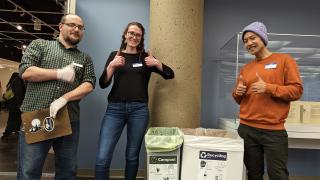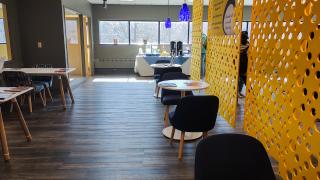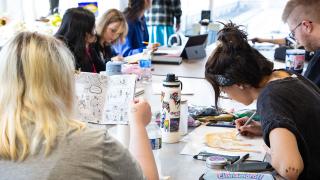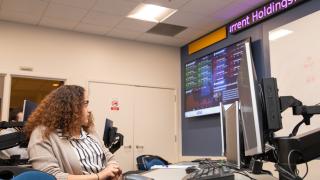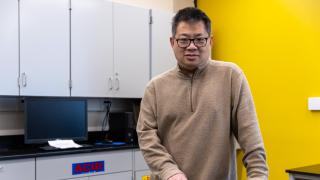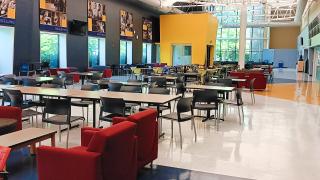
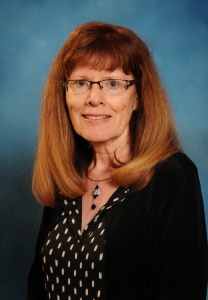
Kriigel, associate director of Mardigian Library’s User and Technical Services, has seen the library’s collections become mainly digital, with more than 500,000 e-books and a journal collection growing from 1,600 paper subscriptions to more than 80,000 digital journal titles.
In collaboration with Education Assistant Professor Danielle DeFauw, she helped create the campus’ Young Author’s Festival, a campus celebration of reading and writing for elementary-aged children.
And Kriigel, who majored in mathematics as an undergraduate, co-chaired the committee that implemented Banner, the campus course registration system.
But even when working for advancement, Kriigel still appreciates the more traditional learning methods too. For example, she leads the UM-Dearborn Book Club R.E.A.D. (Read, Eat and Discuss).
Kriigel said she’s always enjoyed both reading and discussion—especially what’s learned from those conversations. She said that goes back to the second or third grade. Sitting in the back of her parents’ red station wagon, she spoke to her mother about her latest library book, The Bobbsey Twins on Blueberry Island.
“I said the title and pronounced island ‘is-land,’” Kriigel said. “My mom corrected me and explained that the ‘s’ was silent. It was a simple discussion, but I learned something that has stayed with me. That’s the beauty of book discussions.”
Kriigel said she’s always loved libraries—but didn’t set out to have a career in one. Instead, she was going to be a math teacher. She focused on the STEM side of education because she enjoys data and numbers, but she still chose to earn her undergraduate minor in library science.
“At the college I attended, you had to work while in school. And if you had a library science minor, you had a better chance to be picked to work in their library. So that’s what I did,” she said. “While I worked at the library, they started to automate everything. Since I liked data and numbers and that side of things, they asked me to help.”
Kriigel said that experience encouraged her to attend graduate school for library science and start her career path in the field.
And—with the variety of experiences that she’s had—she’s glad that she chose that route.
She’s worked in public libraries and, while answering questions people have brought to her, has learned the name of the only U.S. Army survivor at Custer’s Last Stand (Captain Keogh’s horse Comanche) and the name of Babe Ruth’s bat (Black Betsy). She’s worked in corporate libraries where the information is specialized. And she’s worked in academic libraries, where she helps students and faculty connect to the research information they are seeking.
“Librarians might not know the answers right away, but we do know where to go to find things. That’s a good skill to have,” said Kriigel, who has worked in seven different libraries during her career. “Working at each library has been fun, but I’ve really enjoyed my time on campus. I just love our students. They are hard working and determined. Many are first-generation college students and they are here to change their lives.”
Kriigel said she’s been fortunate to have seen the transformation of student lives. And, over her career, she’s also seen the transformation of libraries themselves.
“I entered at a time when we used card catalogs and had to file everything. Now you can find things with a keyword search. I entered the field at an exciting time,” Kriigel said. “I started when everything was on paper and, although we still have books, the majority of collections are digitized now. And most of our work is done through automation. I feel like we’ve gone through an industrial revolution.”
But, even with the changes she’s seen, she is still passionate about books and discussing their contents with others.
Leading the conversation at a recent campus book club meeting, Kriigel and the group talked about the bestseller Five Presidents: My Extraordinary Journey with Eisenhower, Kennedy, Johnson, Nixon, and Ford by Clint Hill, a retired Secret Service agent.
“You learn so much just by reading. Books spark ideas, and conversations with others add to those,” she said. “So much changes—how we get our information, where we go for information, who we have those conversations with. But, even with all of the changes, the opportunity to learn something new is always there.”

